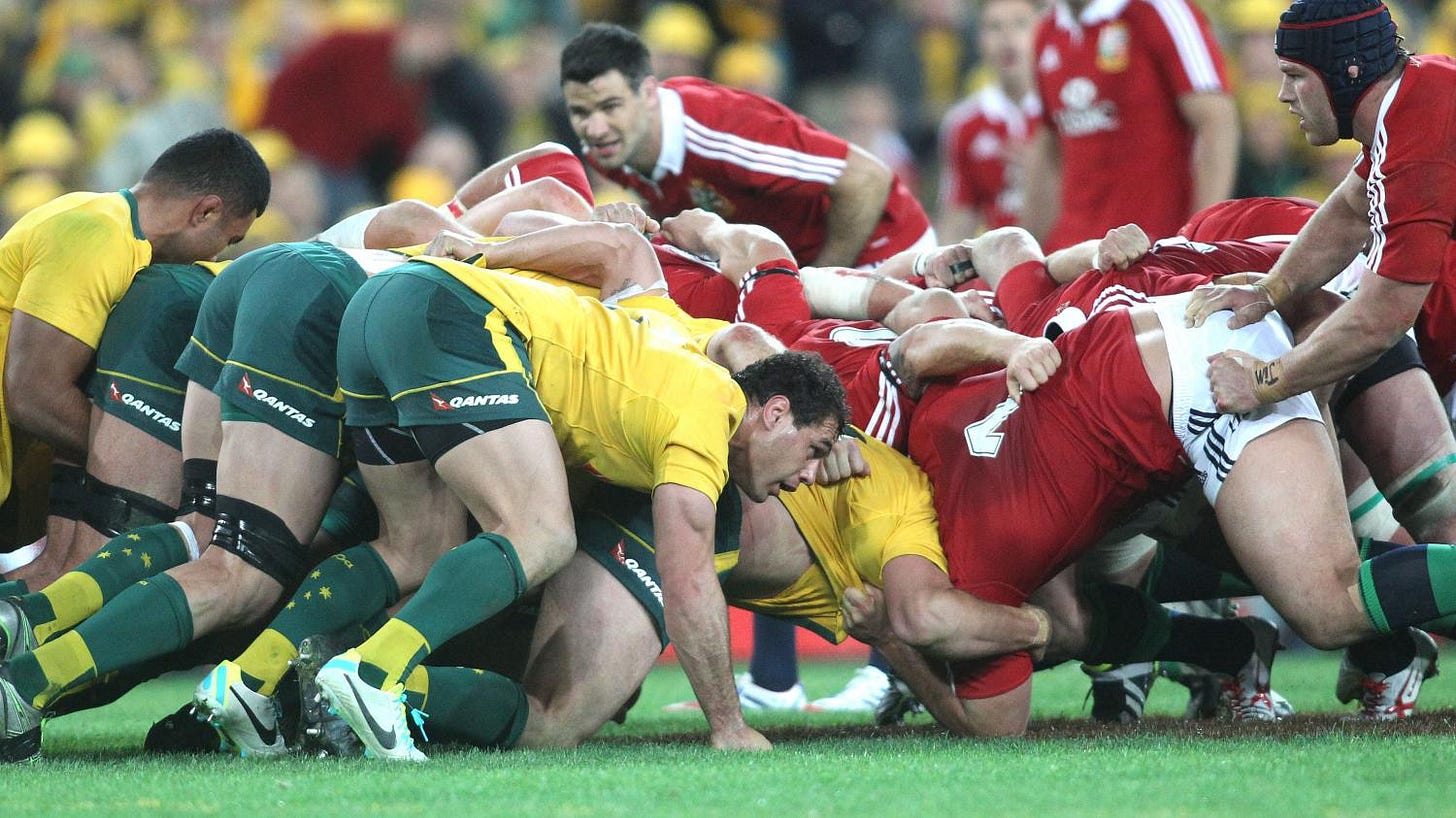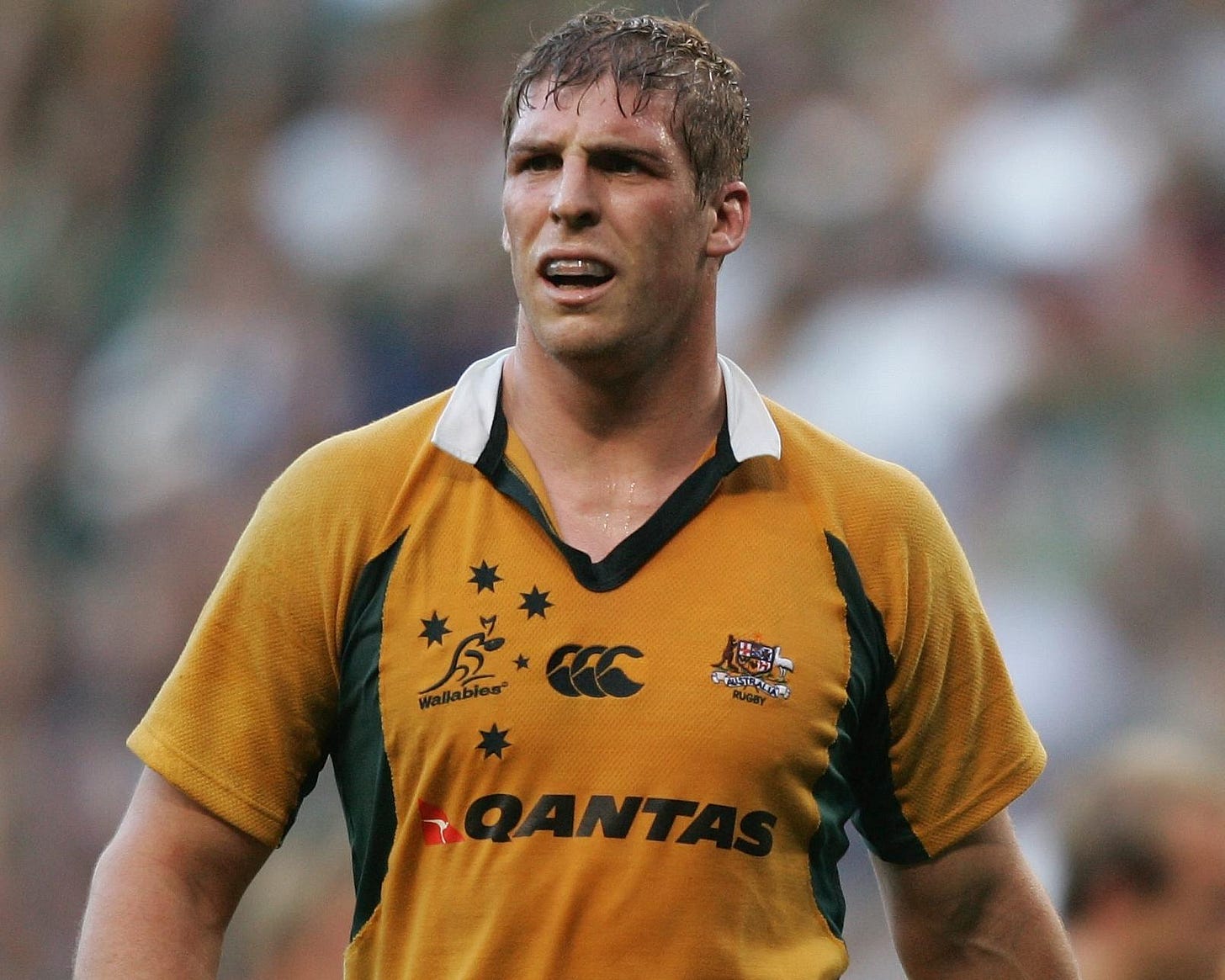Losing to the Lions: My first encounter with trauma
A cautionary tale for anyone who's entire identity is tied to what they do for work.
The following is a recent interview I did with Alex Lowe, the Rugby Correspondent for The Times in the UK.
2023 marks 10 years since we lost to the British and Irish Lions, and being sent off in the decider is a night I’ll never forget.
Ben Alexander: The trauma of losing to Lions stayed with me for nine years
The former Wallaby prop tells Alex Lowe how his sin-binning in deciding Test of 2013 tour left him in a spiral of burnout and depression.
Ben Alexander had it all planned out. He was going to help Australia defeat the 2013 British & Irish Lions in the deciding Test of the series and then propose to his girlfriend, Jen, on the pitch at Sydney’s Olympic Stadium. The ACT Brumbies tight-head prop was living the dream; relishing the once-in-a-lifetime opportunity he had of playing against the Lions and replicating the heroics of the 2001 Wallabies, who had also come from 1-0 down to win the series. “To be a part of it made my head spin,” Alexander says.
In the Lions camp was his opposite number, Alex Corbisiero. The loose-head prop had initially missed out on Lions selection because of injury but he was called up from England’s tour of Argentina, taking four flights from Salta, a city in the foothills of the Andes, to reach Australia and he made the starting team for the first Test, a 23-21 victory in Brisbane. A frustrating calf injury kept him out of the second Test, when Alexander won his 50th cap in a Wallabies victory, but Corbisiero returned for the Sydney decider.
It was a night, ten years ago, that would define their lives.
Corbisiero delivered a man-of-the match display, scoring a try in the first minute and leading the demolition of Australia’s scrum as the Lions rampaged to a 41-16 victory and claimed the series. “That was the pinnacle of my rugby career,” he says. “It was all on the line and I had my best game. Being a Lion has changed my life, my profile, the lifestyle I’m able to live. That is built off the success of the Lions and what I was able to do.”
The brutal duality of elite sport.
While Corbisiero felt exalted, Alexander’s dream had crumbled around him. He was sin-binned after 24 minutes for repeated scrum infringements and did not return to the field. Feeling humiliated, Alexander scrapped the planned proposal and drowned his sorrows. He was still drunk at the team meeting the next day and broke down in tears on the bus to the airport.
The trauma lived with Alexander for nine years, ultimately driving him to a state of burnout and, 12 months ago, into the grip of a depression that could be traced all the way back to that night in Sydney.
“The first two Tests were so close and for the last one to go the way it did was like a dream turning into a nightmare,” he says. “And my self-esteem went through the floor because I took all my pride from how I did at Rugby”.
“After being sent off [sin-binned and then replaced] shut down as I was sitting on the bench and had to emotionally detach from the game hoping we could still get the win. But when we didn’t, I drank myself into oblivion that night, as that was my way of coping back then. Just to drink crazy amounts of piss and try to bury any issues I had.
“I beat myself up for a long time and thought it was all my fault and that I’d let my country down. Plus the online chat about my shortcomings was relentless. I never enjoyed international footy again after that.” Alexander, who played one season for Bedford Blues in the same front row as Dan Cole, won his 71st and final cap in November 2014, against England.
He did propose to Jen a few days after that Lions Test but did not leave the house for a week, embarrassed to be seen in public. They were married on January 4, 2014. “I was still stewing about the loss on my wedding day,” he says.

Seeking both redemption and fulfilment following his retirement from rugby in 2018, Alexander pushed himself to the brink with his work. He ran The Dock, a pub he owns in Canberra, and sold the family house to fund a start-up business called Alfred, a service that counts people’s calories for them to assist with weight control.
Then the pandemic hit. The pub shut down, Alfred was still a work in progress and the Alexanders had three children at home.
“The situation that led to my burnout in 2021 and my depression wasn’t just the pandemic, but the result of decisions I made trying to win back respect from myself,” he says. “I was overcompensating for feeling like such a failure in my sporting career because of what happened that night in Sydney. That led me to take a lot of financial risks in retirement trying to achieve the “mission impossible”, which is to end lifestyle-related disease.”
“Our brains as athletes become wired for excitement and you cannot replace that in retirement. I’ve had to learn the hard way and accept a new pace in life. But I was in a really bad way for three months and felt like my battery for life was flat and I’d lost hope it would ever recharge.”
Alexander found therapy in running and writing.
“I was running last year with a friend of mine called Matt Breen, who had lost his father to suicide and his mother was dying of cancer. The Lions came up in conversation as we ran when one morning and I said how I was embarrassed to describe that night as traumatic and why I never talked about it. After all, it’s only sport. How can you describe that as trauma?’
“But Breeny just said, ‘Mate, it’s ok. It was trauma to you’ and I thought ‘here’s this guy going through genuinely hard end-of-life stuff and he made me feel OK about my issues. That was the beginning of my recovery.”
Alexander has also found solace in the written word, publishing a regular blog called Struggling. He’d written about the Lions experience a few times but last November was the first time he spelled out the full impact it had had on his life. “After I get the thoughts out of my head and written down, I just feel lighter,” he says.
Alexander is anxious for this conversation not to come across as a “poor Ben sob story”. He wants it to be a cautionary tale for other athletes on the importance of not tying their entire sense of worth to their sport. Losing that identity can be painful and destructive. “That’s the main reason why so many athletes are struggling in retirement I reckon,” he says.
Alexander finished playing just over a year after Dan Vickerman, his former Australia team-mate, had taken his own life. “I played the 2011 World Cup with Vicks and I remember after we lost to the All Blacks in the semi-final, we were on my balcony having a beer and he turned to me and said, ‘Benny, I can’t do this anymore.’”
“And I remember thinking, ‘What do you mean? You were unbelievable this whole tournament. And in hindsight, I think he was talking about the pain in his leg. He had broken his leg before the World Cup and played the whole tournament with a metal pole in it.
“About three months before he died, he was in Canberra for a player reunion and he came into The Dock. I remember he was really drunk and had put on a ton of weight. He looked terrible and just stared at me for what felt like an eternity. We didn’t even talk. But there was nothing I could have said to help and to hear he had passed away a few months later, wasn’t a shock.
“This shit is real and we need to be talking about it more because we can’t lose any more athletes to suicide. We can’t be losing anyone. And the one message I’m trying to get out to other athletes in my blog is: ‘If all you get pride from is what you do for work, you will be in a really, really dark place on the day things don’t go to plan’.
“I drew all my self-esteem from Ben the footballer. That is what set me up to fall so hard. But I’m really glad I went through it and learnt to deal with it. If you are doing it tough, there are some great ways to fix it.
“I’ve finally accepted that I’m never going to have a career that’s as exciting as playing professional sport — but I can have one that is infinitely more meaningful.”
It is evening in Canberra and the birds are singing in the background. Alexander has been out walking and talking for the past hour. As the conversation draws to a close, he asks after Corbisiero, who had testicular cancer diagnosed in 2020. Alexander sent him a message of support at the time and did not know that his old scrum rival had beaten the disease. “Oh, thank God,” he says, genuine relief in his voice. “That is great to hear.”
A year on from the darkness, Alexander has rediscovered his zest for life and his love of Rugby. He is on the board of the ACT Brumbies and will lead a tour group to the World Cup in France this autumn. In 2025, The Dock will also host a major jamboree to celebrate the return of the Lions to Canberra and Australia.
“It took me a few years, but I’m back to being a fan of the game like I was as a kid,” he says. “I never dreamed I would be good enough to play for the Brumbies, never mind the Wallabies. I just kept playing because I loved it. But along the way, with all the pressure and with what happened against the Lions, it became a job. But it’s back to being the sporting love of my life again.”
Alex Lowe, Rugby Correspondent
Friday January 13 2023, 3.00pm GMT, The Times




Great read, Benny. Thank you for all you do, including sharing your story.
Our paths crossing has helped me immensely and I know your efforts are helping others.
Morning Ben,
Like exiting a military life, leaving a team environment is a hard thing to do.
I liken it to a turnstile that they don’t really prepare you for, or you don’t see.
Inside looking out is completely different to looking in after the transition.
Having goals, mates going through similar situations, and family around takes some of the burden.
Resilience is the ultimate here though as that sets up the discipline to get it done 👍🏻
When the ref sees a different picture to what you want them to, can be an impossible one to change no matter what.
That’s rugby, that’s life.